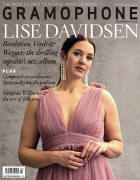Texte paru dans: / Appeared in: |
|
|
Outil de traduction (Très approximatif) |
|
|
Reviewer: Alexandra Coghlan Today Sonya Yoncheva’s performance diary is a cluster of Violettas, Normas and Desdemonas. A role debut as Aida is scheduled for later this year, with Rusalka and Verdi’s Leonora to follow shortly after. But it wasn’t long ago that Yoncheva first emerged as a baroque soprano. It’s a repertoire the Bulgarian singer has never fully relinquished, returning to it with a storming Handel recording (4/17) and a sensual firecracker of a Poppea for Salzburg the following year. Now she returns once again in a musical ‘rebirth’ that brings a new voice and approach to music by Monteverdi, Cavalli, Strozzi and more. Yoncheva’s collaborators are the wonderful Cappella Mediterranea and their artistic director Leonardo García Alarcón. Always game for some reinvention in the service of musical drama, they here set aside their usual incisive attack to become a ‘halo’ of sound around the soprano – tone consciously softened and blurred at the edges, as though the entire ensemble has become a single lute. It’s an effect that works wonderfully to summon the hazy, shadowy darkness of Stradella’s ‘Queste lagrime’ – the scenesetting opener in which we hear just how far Yoncheva is willing to bend, flatten and rough up her plush-toned soprano to squeeze as much emotion as possible out of this musical soliloquy. It’s equally effective (and, often, extreme) in the Bulgarian folk song ‘Zableyalo mi ag∫nce’ and a shattering ‘Luci mie’ from Cavalli’s Xerse, and perhaps at its best in Alarcón’s own ‘Y a tus plantas Nisea’ – reconstructed for Antonio Draghi’s El Prometeo from words alone in a sort of Albinoni-esque fusion of Romantic and Baroque instincts. But elsewhere the new weight of the voice seems to drag things down, obscuring details in text and articulations, overthickening the stark lines of Strozzi’s ‘L’Eraclito amoroso’ and sexing up Dowland’s ‘Come again, sweet love’ until it swaps its suggestive freshness for something much more explicit. Ferrabosco’s ‘Hear me, O God’, with one verse turned into a spoken melodrama, feels closer to Verdi than it does 16th-century England. And the less said about Abba’s ‘Like an angel’ the better. Yoncheva is a consummate performer, and there’s a no-holds-barred quality to this recital that’s very appealing, both in the singing and in the gleeful, mercurial performances from Alarcón and his band. As the unexpected Abba encore suggests, it’s an album that draws connections between musical moods and textures without any real concern for period or genre. Authenticity is out and unbridled, expressive freedom is very much in. |
|




